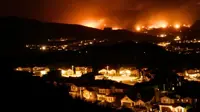Syria offers to help US against IS, but warns against air strikes
26 Aug 2014
yria's foreign minister Walid Muallem on Monday offered to help the US fight the Islamic State (IS) militant group, saying Syria was "the centre of the international coalition to fight Islamic State".
At the same time he warned the US against any unilateral strikes on Syrian soil, saying the US must co-ordinate with the Syrian government before launching any air strikes on its territory.
"Anything outside this is considered aggression," he said.
The US has already bombed IS fighters in Iraq and has hinted it would be willing to take action in Syria. The IS controls large swathes of land across both countries.
Western powers generally shun Syria's government, accusing it of carrying out atrocities in its three-year civil war.
Muallem's comments are one of the first public statements from the regime on IS.
They came a day after IS militants overran a major air base in north-central Syria, putting the Islamic State in full control of Raqqah province, where American photojournalist James Foley was held for much of his captivity and where his beheading last week is thought to have occurred (See: West aghast as Islamic Militants video beheading of US scribe).
Raqqah also was the site of a failed rescue attempt this summer in which Delta Force commandos sought to snatch Foley and a group of other Americans held by the Islamic State from a prison east of Raqqah, said US officials and witnesses in the area.
The capture of Tabqa airfield Sunday was the latest in a string of recent military successes for the extremist fighters, who have been consolidating their hold across northern Syria even as US airstrikes launched earlier this month temper the group's expansion in northern Iraq.
US officials have not ruled out pressing the airstrikes into Syria, telling reporters last week that the United States would not be restricted by ''geographic boundaries'' when confronting the militants.
More than 191,000 people have been killed in the Syrian conflict up to April, the UN says.
The conflict began as a popular uprising against the autocratic rule of President Bashar al-Assad. The US and other Western powers have supported the opposition and repeatedly called for Assad to resign.
But as the death toll has mounted, violent jihadists like IS have emerged as the most formidable rebel groups.



.webp)
.webp)

.webp)
.webp)

























